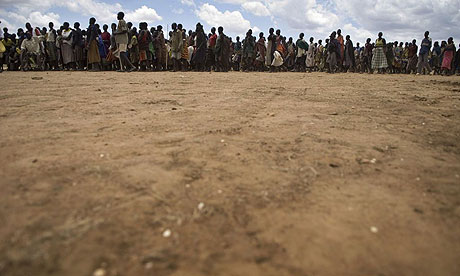By Mubatsi Asinja Habati
As preparations for this year’s UN climate talks
under the UN Framework on Climate Change (UNFCC) conference of parties (COP17) take
centre stage, Uganda government and civil society don’t want to be left out.
This week has been a bee-hive of activity as government held the
intergovernmental panel on climate change (IPCC) workshop where its position in
line with the rest of Africa ahead of Durban COP17 was stated. The civil
society organizations working on programmes related to climate change, on the other
hand, were also thinking together on familiarization of the processes of the
COP in the same week. Next week final touches will be hammered where the
government negotiating team will share with the civil society members, who are
mainly going to play an observation role at the South Africa COP17. The IPCC is
releasing its report this weekend on Nov. 19 as a feed in to the proceedings
toward the much reported climate talks.
Before the delegation heads to Durban late this month,
Uganda like most African countries is grappling with significant challenges
related to coping with the impact of climate change. First the Uganda government
has recently appreciated the severity climate change is causing to the
livelihoods of the citizens by establishing a Climate Change Unit within the
ministry of Water and Environment to spearhead the processes aimed at
mitigating and adapting to variations in climate and weather. A policy on
climate change is also in the pipeline. A government official says the main
focus is currently on energy, agriculture and the environment.
However, the civil society orgnaisations say though
these are steps in the right direction government needs to do more. This is because
there are several gaps in government’s response to the impact of climate
change. Availability of local research
relating to climate change is still very limited. One of the available such research
done by Africa Climate Change Resilience Alliance (ACCRA), a consortium made up
of Oxfam GB, Save the Children, Care International, World Vision and the
Overseas Development Institute to do advocacy and training in climate issues, shows
bleak future and recommends Uganda to do more at grassroots. Uganda metrological department remains handicapped
to deliver weather climate information
to farmers, pastoralists for early warning systems yet where information is received
the people have less interpretation capacity.
Given this state of events over 200 NGOs and civil
society organizations working on climate
change mitigation and adaptation measures under the umbrella of Climate Action Network
Uganda (CAN-U) are cajoling governments to take action and speak out in the
COP17. These NGOs have joined the organization of the TransAfrican caravan of
hope, which is a 17 day road trip by bus through 10 African countries to create
awareness on climate change
impact, prior to in lead up to UN
climate talks in Durban. The caravan that began in Bunrundi with a bus of people is
expected to reach Durban with at leats 300 people who include the youth,
farmers, and civil society activits to tell their on how climate change is
impacting their lives and what leaders at the COP17 can do for them.
Already farmers are complaining reduced crop yields due to climatic variations. Uganda’s
Environment minister Maria Mutagamba is optimistic that COP17 will commit rich
countries to finance mitigations mechanisms in the poor countries as they cut
on their carbon emissions so that effects of climate change exhibited in adverse droughts in Karamoja,
intensified floods in Teso will make
lives of the poor a little comfortable. “I don't want to see Kyoto protocol
buried in Durban. Rich and industrial countries should meet their commitments
to reduce greenhouse gas emissions,” said Mutagamba.

No comments:
Post a Comment